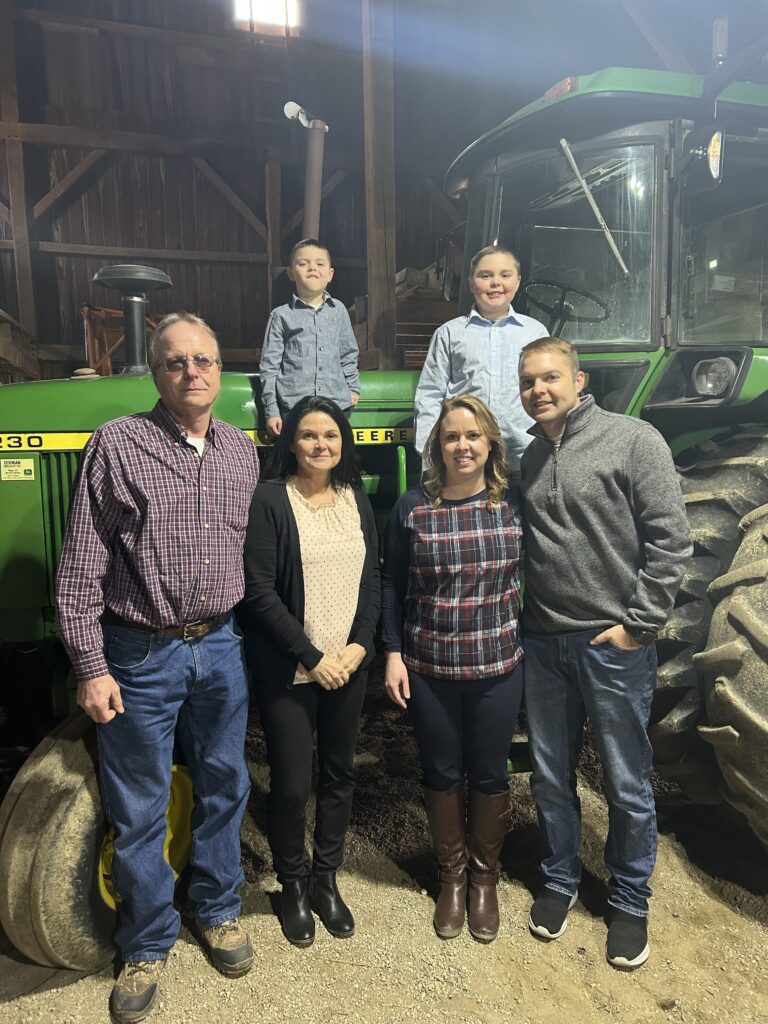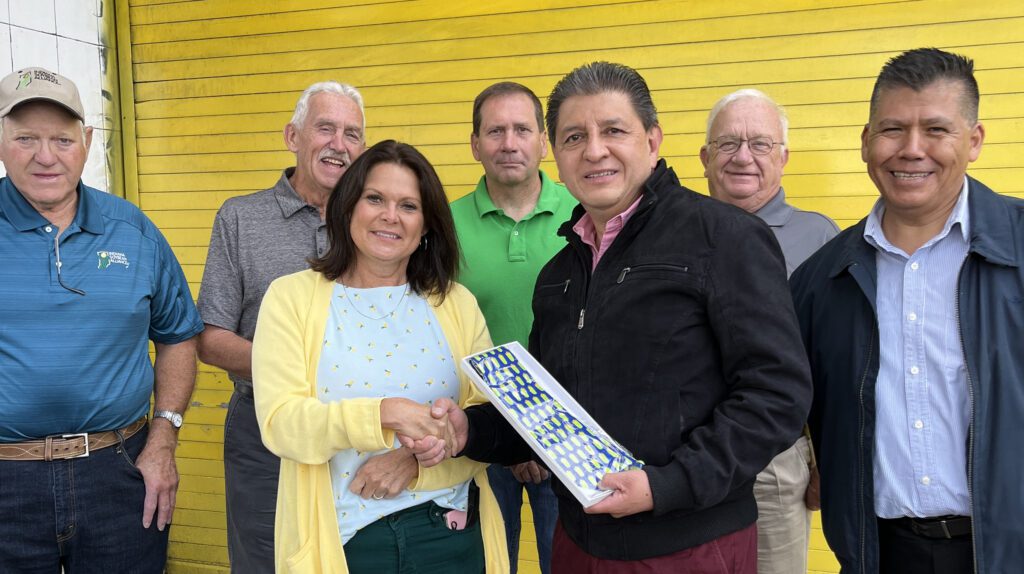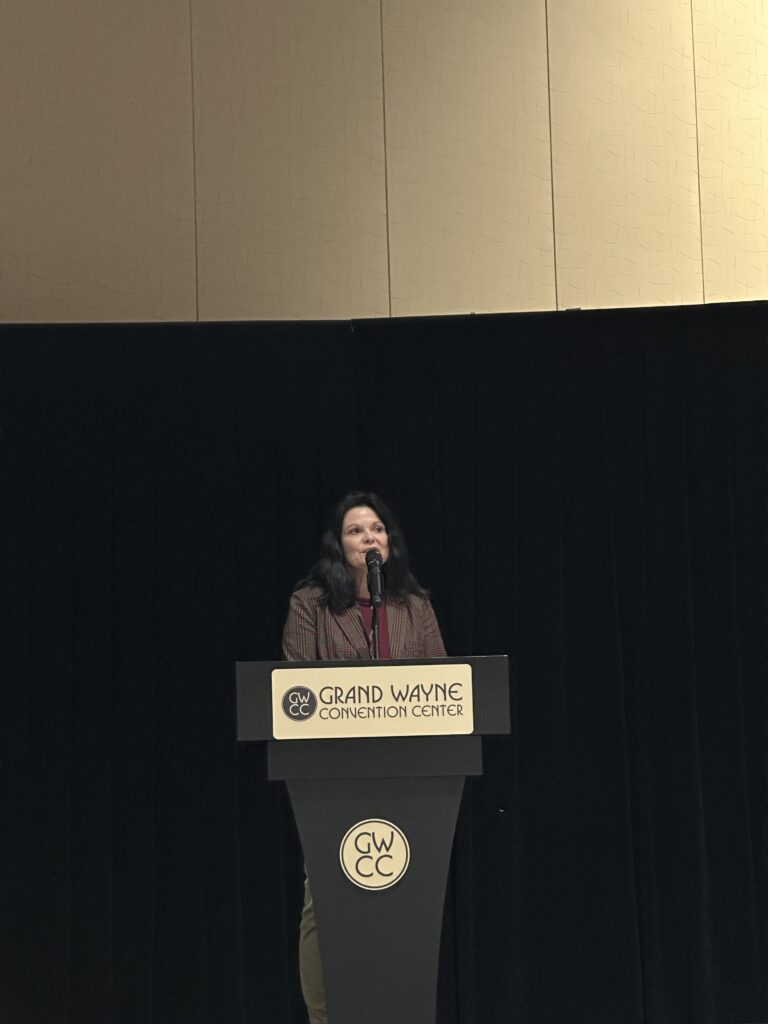Highley respects farm’s past, enjoys its present, and looks to ag’s future

By Dave Blower Jr.
There are no shortcuts in agriculture. With planning and careful attention to detail and hard work, a farm can last for generations.
For Janis Highley, she respects the history of Indiana farm families. In the present, she works with her husband, Larry, as fifth-generation operators of their family farm. And as a director for the Indiana Corn Marketing Council (ICMC) and organizations like Indiana Farm Bureau, she plans for future generations on her farm and future
generations of women in agriculture.
Larry and Janis Highley are the fifth generation to live on the farm that has been in his family for more than 100 years. On their small farm in Huntington, Ind., they produce No. 2 yellow corn and high oleic soybeans. They can store 100 percent of their soybeans and 50 percent of their corn.
The farm is a minimum-till, row-crop operation.
“My father, Clarence, used to no-till everything back in the 1980s; it was something I had wanted to try, and it was working out pretty good for a while,” Larry said. “After a while, though, we started getting a problem with corn borer, and that’s when we started working the ground for corn. We still no-till all of our beans, and I’m trying to limit my passes on the corn to save some money. I’m only working the ground occasionally.”
Highley said they keep a few chickens and some cattle strictly as food for the family.
Their corn goes to feed hogs. Their soybeans, on the other hand, go to ADM and are crushed into high oleic soybean oil. ADM then ships that oil to the Hershey
Company to eventually go into their chocolate.
“Our contracts have been with ADM and Hershey’s; that’s where the oil has been going,” Janis said. “I think that’s pretty interesting when you think about it.”
In addition to the farm, Larry and one of their sons, Brian, owns and operates Zeller Construction. This business was owned by Highley’s father, Marvin Zeller, before Larry bought it several years ago.
Janis graduated from Huntington University with a degree in business management. She is employed part time at Strategic Grain Hedge as a grain analyst assistant. She helps farmers and agribusinesses protect their bottom line through grain sales and hedges on the Chicago Board of Trade.
War bonds help buy a farm
The Highley farm dates back to 1918 when it was purchased by Larry’s great-great-grandfather, George Walker, with Liberty Bonds. These bonds were sold by the government to help pay for World War I. The 338-acre farm cost $57,000 at that time. Walker moved from nearby Converse, Ind., to buy the farm.
“We have a report of the sale from an old Warren (Ind.) newspaper account,” Larry said. “The guy who my great-grandfather bought the land from was happy to get the Liberty Bonds through the sale. George Walker also bought some farm equipment with the property. The two-story house was moved from the back of the field up closer to the road. I don’t know what year that happened; I just remember hearing about that in our farm’s history.” Janis added, “And we still live in that house today.”
Other than moving the house, the family farm has remained relatively unchanged. Although they no longer raise sheep anymore.
In fact, a wagon and a hay tedder from the original farm remain on the property. With an appreciation for antique farm equipment, the Highleys have refurbished the hay tedder and display it at the farm.
By the time the United States entered World War II, Larry’s grandfather, Ralph, was managing the farm. Once
again, America’s role in a World War influenced the farm.
During the war, farm equipment manufacturers had limited supplies, so fewer tractors and implements were made during 1940s. Most equipment manufacturers sold machinery at this time through a lottery system. Highley’s family was fortunate enough to win two of these lotteries.
Highley’s son, Brian, who is the sixth generation on the farm, is a fan of the antique tractors.
“We had two tractors that were bought new in the 1940s that stayed on the farm for a long time,” Brian said. “One is a 1946 Farmall A, wide-front tractor, and the other is a 1947 Oliver 70 Row Crop tractor. My great-grandpa, Ralph, bought both of them. He put his name in the lottery at the Farmall dealer in 1946 and won the chance to buy the tractor, then immediately got his name pulled again from the Oliver dealer. In those days you didn’t know if your name was going to be drawn again, so you didn’t want to pass up the chance to buy a tractor. That Oliver 70 was gifted to my dad from my great grandpa, and we still have it. The Farmall isn’t with us anymore. My dad refurbished the Oliver in the early 2000s, and we still have it. It has been on the farm since 1947.”
Corn checkoff work

Highley was first elected as a board director to ICMC, Indiana’s corn checkoff program, in 2021. She was elected
to a second term last year. During her time on the board, she has served Indiana corn farmers in a variety of roles. She has also volunteered with ICMC partners such as the U.S. Grains Council and the National Corn Growers Association (NCGA).
Highley helped to plan the NCGA’s Women and Mentors Retreat, and she served on NCGA’s Leadership Academy.
“I want to be a voice for Indiana corn farmers at the county, state and national level,” she stated. “I want to continue work to help export our product to new markets as well as find new uses for Indiana corn.”
That passion for more export markets led her to work on NCGA’s Committee on Marketing and Trade. She also represents ICMC as a delegate on the U.S. Grains Council, which develops export markets for U.S. corn, barley and sorghum.
In September 2022, Highley and a handful of other Hoosier farmers traveled to Mexico City to talk to end users of Indiana corn. This trade mission took place as Mexican officials were threatening to prohibit white, food-grade corn from entering their country because of widespread use of GMO corn varieties in the United States.
Highley said the farmers were able to witness corn coming off a barge in Progreso, a port city on Mexico’s Yucatan peninsula, get transported to a facility and packaged into 50-pound bags. The bagging facility is a project paid for by ICMC.
“I think it was very good for me and the other farmers to be there,” Highley explained. “The people we talked to had
no problem buying American corn. It was good for me to take what I learned in Mexico and tell farmers in Indiana about it.”
She said it was clear that the problems with Mexico were political. Being able to share that message with Indiana farmers helped them to understand the issue. Highley said she’s able to explain the value of checkoff work to her friends and neighbors.
“Many of the farmers I talk to now want to know why we spend so much money internationally instead of spending it in Indiana,” Highley said. “I explain to them that we need to develop these new markets to help prices for our crop in Indiana. We need to build relationships with these buyers in foreign countries. It takes a long time to build these relationships, but they are valuable to all Indiana farmers.”
Policy work and the future
While Highley is a board director for the state’s corn checkoff program, she is dues-paying member of the Indiana Corn Growers Association, a policy group that represents the state’s corn growers. She said making sure ag policies benefit Indiana’s farmers today also helps ensure that the next generation can continue to farm.
Highley is closely watching changes to Indiana’s Grain Indemnity Fund at the state level while monitoring tariffs, an expansion of higher blends of ethanol and the food insecurity in national politics.
In addition to Brian, who lives near their farm with his wife, Jessica, and his two sons, Elijah, 8, and Aiden, 5, Highley has another son, Aaron, who lives and works in Fort Wayne with his wife, Annalise.
Brian has shown an interest in continuing the farm into the sixth generation, and Elijah enjoys doing farm work with his dad.
“We will have to see if there will be a seventh generation,” Highley said. “We’re very happy to have this life and this opportunity. We enjoy sharing it with as many people as possible.”
Highley among the feature speakers at 2025 Women Engage Conference
By Amie Simpson

Detailed breakout sessions, networking opportunities and a keynote presentation were the highlights of the 2025 Ag Women Engage Conference on Feb. 13 at the Grand Wayne Convention Center in Fort Wayne, Ind.
Indiana Corn Marketing Council (ICMC) Director Janis Highley spoke to attendees about the value of the checkoff in Indiana and volunteering to serve on boards.
“The Indiana Corn Marketing Council is a statewide organization that serves Indiana corn farmers through checkoff programs that help create demand and broaden markets for Indiana corn. The funds are used for promotion, research and education,” she said. “ICMC is led by volunteer farmers. Serving on a board is important because it allows you to contribute your expertise, leadership, and vision. Two big passions for me are farm safety and trade. If you are interested in getting involved with ICMC, you would be playing a very important role in the board’s accountability, credibility, and fostering long-term sustainability. If you have the time and interest to be a voice and advocate for farmers, we would love to have you. We want you to ask questions and we want you to be involved.”
Highley added that she’s excited about what’s going on in Indiana agriculture.
Breakout session topics included: farmland value updates, navigating mental health, farmland property taxes, succession planning, Indiana animal agriculture updates, farm financials networking roundtable, diversifying farm operations, and much more.
ICMC and the Indiana Soybean Alliance were sponsors of the Ag Women Engage Conference. The Purdue Extension Women in Agriculture team organized the event.
Posted: March 21, 2025
Category: ICMC, Indiana Corn and Soybean Post - March 2025, News, Producer Engagement



